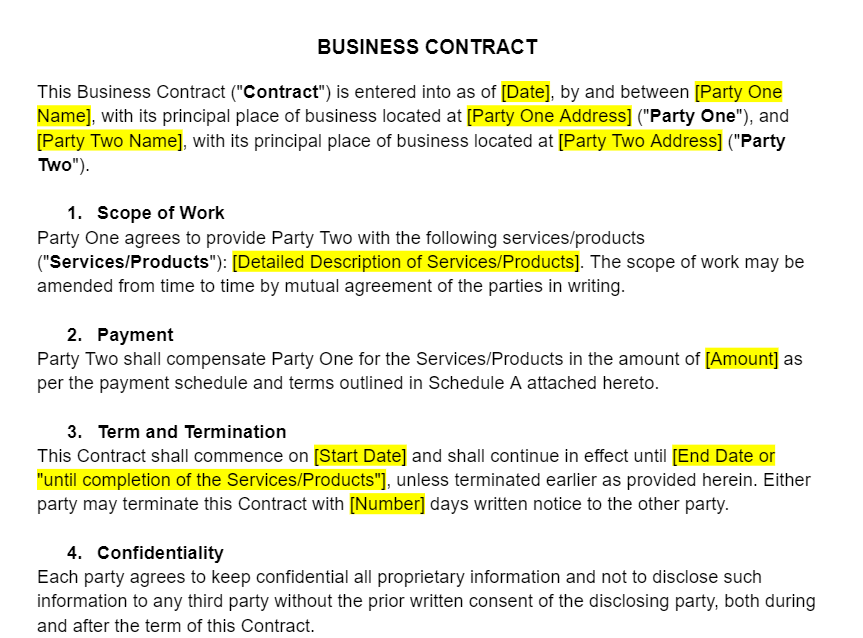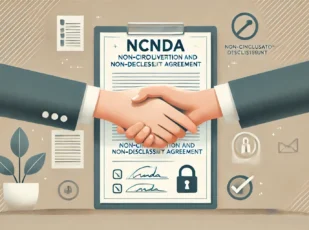
Business Contract Template
8 Downloads
Commercial
January 11, 2025
Sayantani Dutta
A Business Contract is a crucial document in global commerce and corporate partnerships. It essentially shapes the foundation of business relationships and transactions. As a comprehensive framework outlining the terms of agreements, roles, responsibilities, and expectations between parties engaging in business together, Business Contracts have wide-ranging benefits—from enforcing a non-disclosure agreement and protecting confidential information to providing indemnification against inadequate deliverables and complete adherence to the payment terms.
Generally, a business can sign a contract with another business, an individual, an agency, or an independent contractor. The exact name of the document can change, therefore. For example, the type of contract between a corporation and a freelancer might be called a contract agreement or an independent contractor agreement. One between a part-time hire might be called an employment contract. A business hiring an agency for a product launch campaign might call it a service agreement. And so on.
At its core, this is a legally binding document that can be called by many names. All such business contracts or business agreements have the same objectives and similar sections or contents. They protect the contractors (such as a service provider) and the business (the client).
In this article, we are going to take a closer look into Business Contracts. We will highlight its indispensable role across industries, the potential risks of proceeding with an unreliable template, and the advantages of using the superior, legally binding agreement template from FreshDox.com. Let’s get right to it!
What is a Business Contract?
A Business Contract is a legally binding agreement between two or more parties that outlines the terms and conditions of a business arrangement. Whether it is a purchase agreement, consulting agreement, contractor agreement, vendor contract, part-time employment agreement, construction contract, sales agreement, or a legal document with any other name—at its core, it has similar provisions, details, and clauses to protect the rights and interests of both parties, such as NDAs and pricing schedules.
Typically, a business contract can cover a wide range of details, including the nature of the business engagement, scope of work, payment terms, confidentiality clauses, and dispute resolution mechanisms. From specifying the payment details to offering guidelines for the correct, lawful use of any intellectual property such as trademarks and copyrights during a project, a legal contract between businesses and entities needs to be comprehensive.
Business contracts are fundamental in establishing a clear, mutual understanding of each party’s contributions, expectations, and obligations to ensure a smooth operational flow of business activities.
Benefits and Importance of a Business Contract
While many would like to think that a business contract is a mere formality, an agreement to initiate a relationship, that could not be further from the truth. A robust, all-encompassing business contract is essential for the security and efficiency of any business transaction. It ensures that all parties have a clear understanding of their roles and responsibilities. Needless to say, this is crucial for preventing misunderstandings and, in turn, conflicts.
So, the business contract is the document that sets out explicit terms and conditions for the work or project to be carried out. It facilitates trust and confidence between parties. Ultimately, it paves the way for successful, long-lasting business relationships where everybody wins.
It is more than a simple contract with a description of the work to be done and the payment details. It includes everything from the warranties and indemnification clauses to conditions for termination, dispute resolution, delivery timelines, and more.
Furthermore, a business contract also provides a legal safeguard for both parties as it serves as a legally enforceable document that can be used to resolve disputes and protect the interests of the parties in case of breach of contract. This legal protection is indispensable when it comes to ensuring that business engagements of any kind are conducted in a fair and transparent manner. This way, the business contract terms work together to minimize risks and potential liabilities.
Doing Business Without a Good Contract
A business contract needs to be comprehensive, future-proof, and robust in its language. It needs to be legally enforceable under the governing law. Whether it is a small business or a large enterprise, partnership agreements need thorough descriptions of the waivers, warranties, scope of work, delivery timelines, payment terms and schedules, confidentiality, and so on.
That is why you should never rely on free contract templates. A proper, legal agreement is the only tool that can help you minimize risk and take action appropriately if something breaches the terms of the contract. Without a comprehensive business contract, both parties are exposing themselves to significant risks and uncertainties down the line.
Lack of a formal agreement or relying on an inadequate template to create your agreement can lead to ambiguities in the scope of work, payment terms, and delivery timelines, among other things. This, in turn, can result in misunderstandings and expensive legal disputes that you want to avoid at all costs.
These issues will ultimately impact project timelines, financial outcomes, and even the professional relationships you have with the service providers, vendors, and other businesses severely. All this can potentially derail not just the project in question, but business operations in general.
There is another key consideration here—without a documented agreement, it is next to impossible to enforce terms and protect rights (such as IP rights) in the event of non-compliance, disagreements, or inadequate performance, the way you want. This will leave parties vulnerable to financial losses, legal disputes, and possibly even damage to business reputation.
By now, it is clear how the absence of a robust contract can affect business—but you should also be aware that it can complicate matters related to intellectual property rights, confidentiality, and non-compete clauses. This further increases the risks involved in business transactions. So, by all means, you should have a comprehensive Business Contract based on a robust template.
Key Elements of a Business Contract
A business contract needs to cover all bases to be enforceable and airtight. As such, there are a few sections that you should know about. The exact conditions, clauses, and descriptions under each section will differ, of course, from case to case. But generally speaking, the contents of business contracts offer similar protections (mainly for the client, but some protections for the entity being contracted as well—like a freelancer, agency, vendor, or service provider).
There are six critical components of a business contract.
Parties Involved
A business contract should always clearly identify the parties entering into the agreement. This might seem like an obvious step, but mistakes are all too common and can cause confusion later on. State the full legal names of all parties involved, whether they are individuals, companies, or other entities. Also, keep in mind that you are outlining the roles of each party being mentioned, as well as all the responsibilities and obligations they will have under the agreement.
Apart from identifying the parties, your business contract should also specify any third-party beneficiaries—individuals or entities that are not directly involved in the agreement but may benefit from its terms. This ensures all parties understand their standing within the contract.
In simpler terms, the business contract needs to reflect who is responsible for what.
Scope of Work
The SOW is the heart of most business contracts. This section has no room for ambiguity about what is expected from all parties involved. The best case scenario is ironing out all the details before the contract so everyone is on the same page and all doubts/queries have been cleared about what is to be done, exactly (and up to what standard).
More specifically, the Scope of Work section in your Business Contract will outline the exact tasks, services, or products to be provided, including the timeline for delivery and any milestones that need to be met (such as partial delivery in X number of days or adherence to some code of conduct).
Here is a quick checklist for an effectively written SOW section. Make sure it includes:
- What will be done: The detailed activities and services being offered.
- How it will be done: Methods or standards the work will follow.
- When it will be done: Set timelines, deadlines, or project phases.
- Any deliverables: Specific products or results expected from the work.
Payment Terms
This section protects both parties financially and ensures that there are no surprises when work has been done. In this section, you will have clauses that clearly outline how much money will be paid, when it will be paid, and what the payment structure will look like.
Typically, the payment terms in a Business Contract include the amount (total cost of services or goods), schedule (upfront, in installments, or upon completion of milestones), penalties (interest charges or service suspension if payments are not made on time), and accepted payment methods (bank transfers, credit cards, checks, etc.).
Everything has to be laid down in detail before the work commences. And keep in mind that if either party fails to meet the agreed-upon payment conditions, the contract serves as a formal agreement that can be referenced in case of legal action.
Confidentiality & Intellectual Property
Next up, your Business Contract needs protection for IP (brand assets, copyrights, trademarks, etc.) and confidential information (internal documentation, trade secrets, etc.). This protects the proprietary information that will be accessed and used to ensure the delivery of the SOW. Essentially, these clauses state that both parties agree to keep sensitive business information confidential and that any intellectual property developed during the agreement is clearly assigned.
To further break it down, the confidentiality agreements prevent either party from sharing proprietary data, trade secrets, or personal information that could harm the business. And the intellectual property provisions outline ownership rights for any creations, inventions, or designs developed during the term of the contract. For example, if a freelance designer creates a logo or a software company builds an app, the contract will specify who owns the rights to these intellectual properties.
Also, do not forget clauses about protecting your existing IPs. To extend the previous example—if you already have a logo and are getting an app made, that logo will be used by the freelancer. It cannot be misused or advertised by the freelancer in ways that would affect your business. You will put conditions for its use (and the limitations thereon) among these clauses.
Without confidentiality and IP clauses, your business is not sufficiently protected against competitors or unauthorized third parties who might misuse confidential data or ideas developed through the relationship. Without this section, one party might unintentionally gain access to proprietary information or use the work without proper authorization, causing potential damage to the business.
Another unique consideration here is that of a non-compete clause. Typically, if you hire an expert team or agency for a particular job, then you can be sure that those people are not going to be your competitors, ever. But sometimes, it just so happens that a business idea is good enough and the circumstances are just right that such a team or agency might develop their own product to compete with you, temporarily or partially ignoring their main business focus. If you would like protection against this, you might want to strengthen your IP clauses with non-compete clauses as well.
Dispute Resolution
No one wants to get to the point of a legal dispute, but it is always better to have a clear path in place just in case. Your Business Contract will, therefore, include a well-drafted section on how any disputes are to be handled. This includes the methods by which any disagreements will be handled.
In this section, you can include:
- Mediation: An independent third party helps resolve the dispute.
- Arbitration: A neutral arbitrator makes a binding decision.
- Litigation: In cases where the dispute cannot be resolved amicably, the contract may specify legal action through the courts.
This section should also outline the jurisdiction, meaning which court or legal body has authority over the dispute. All this needs to be specified in advance to avoid confusion and delays when a dispute does arise.
Termination Clauses
Lastly, you have the termination clauses. These are the conditions under which the contract can be ended by either party prematurely or upon the completion of the work. Whether it is due to a breach, failure to meet deadlines, or simply because the project is complete—this clause helps protect both sides in case things go south.
Here is what to include among these clauses:
- Termination for Convenience: This allows either party to end the agreement with prior notice, often for any reason.
- Termination for Cause: This occurs if one party fails to uphold their obligations or breaches the terms of the agreement.
- Post-Termination Obligations: After termination, the contract should specify any final actions required by either party, such as the return of property or payment for work completed up until that point.
Clear termination clauses set expectations on how the relationship can end and what responsibilities remain after the contract has ended. Again, this is also pretty important to avoid disputes down the line and ensure that both parties can walk away with a clear understanding of their final obligations.
Optimize Your Business Agreements with FreshDox.com!
Business Contracts are the fundamental currency of corporate relationships and all types of work projects today. Understanding their importance, FreshDox.com offers a comprehensive, customizable, and legally sound Business Contract Template designed to meet the diverse needs of modern business engagements!
Our template is crafted by legal professionals and makes it possible for you to tweak, minimize, or flesh it out based on your unique needs and project details. It further ensures that every aspect of your business agreement is clearly articulated, providing a solid foundation for successful and legally sound transactions.
So, when you use FreshDox.com by signing up for an account, you gain access to this template, as well as a wide array of other legal, business, and professional templates—all developed by experts and 100% customizable. You can even use our 14-day trial period first, if on the fence, and explore the advantages of our templates through the Basic or Premium Plans. Basic Members can download up to three templates a month and Premium Members have unlimited access to all of our templates.
We empower you to establish secure, clear, and enforceable agreements so that you can have successful, long-term business partnerships without disputes.
Sign up for FreshDox.com and choose our Business Contract Template as the starting point—this not only saves you time and resources but also secures the integrity of your business transactions. So, wait no more! Ensure the success of your business engagements and protect your interests with the professional solutions provided by FreshDox.com.
Related Templates
Discover more templates that align with your needs and preferences.

Ready to Sign Up?
Sign up for FreshDox.com’s 7-day trial and discover why so many individuals and businesses trust us for their legal document template needs.
- Cancel any time
- 7-day free trial
- From 300+ Customer Reviews
















